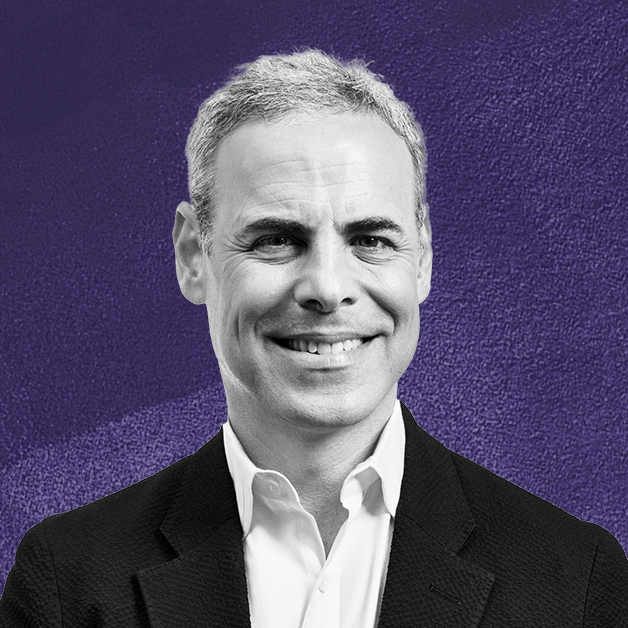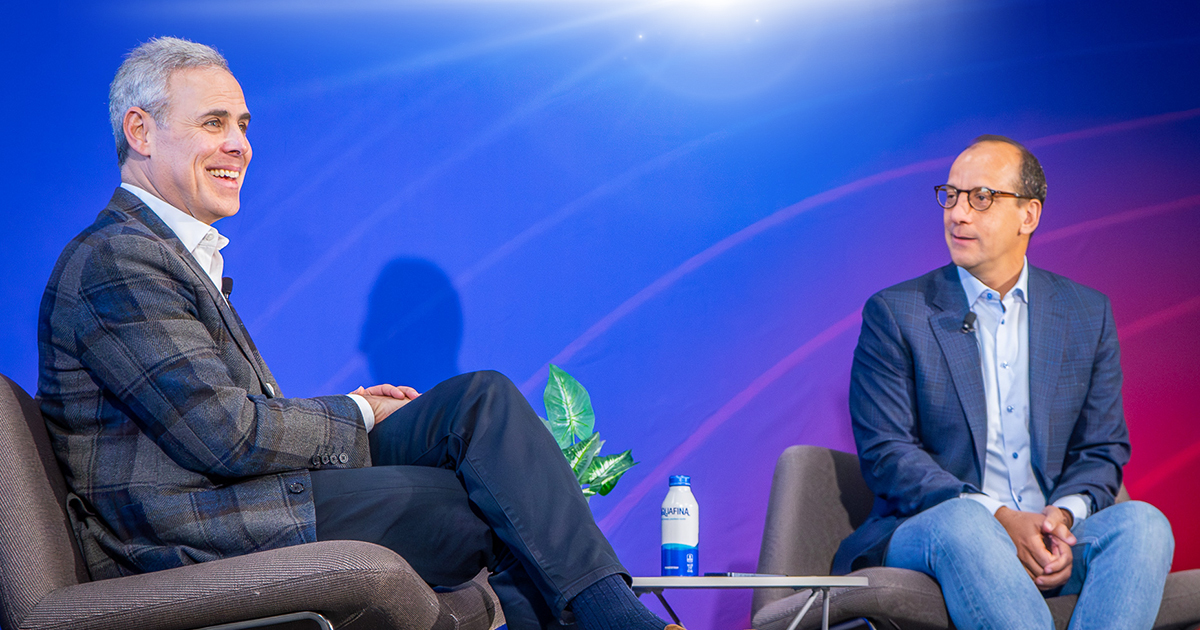
Kogod School of Business
Pita, bowl, or salad? Chicken, falafel, or spicy lamb meatball?
Frequent customers will easily recognize those choices as part of the menu at CAVA, the fast-growing, fast-casual Mediterranean chain with a location just a shuttle ride away from AU’s main campus—among hundreds across the country.
But the multi-billion dollar company’s origins and evolution hold no shortage of lessons for aspiring entrepreneurs, Kogod Dean David Marchick noted in welcoming CAVA CEO and co-founder Brett Schulman to the Veloric Center for Entrepreneurship on February 14.
“We’re going to hear a crazy story about entrepreneurship: Success, a lot of failure, but resilience. It’s a great story,” Marchick said in an enticing preamble to a discussion held as part of the Alan Meltzer CEO Speaker Series.
Early Challenges
The story of CAVA actually began nearly two decades ago, about 15 miles from the AU campus. In a non-descript Rockville, Maryland shopping center, a single full-service restaurant called CAVA Mezze proved to be the starting point for what would, one day, turn into a major corporation.
The original restaurant was built on the passion of sharing beloved Mediterranean recipes for the three founders and childhood friends: Ike Grigoropoulos, Chef Dimitri Moshovitis, and Ted Xenohristos.
The three men ran into many challenges early on, from hurdles in getting a lease to hiccups in securing financing and complying with regulatory requirements. At one point, Schulman recalled, the group raised capital for their initial restaurant by selling off a Jeep won in a church raffle.
Schulman himself wasn’t involved at this point; he was working on Wall Street in the mid-2000s, and feeling unfulfilled.
I was making a good income, but I felt I wanted to do something of more meaning.”

Brett Schulman
CEO, CAVA
Building a Fast-Casual Concept
In the late 2000s, a mutual friend introduced Schulman to the CAVA Mezze founders.
By this point, he had begun to serve as chief operating officer of the healthy snack company Snikiddy Snack, founded by his wife. And he was eyeing his next opportunity.
Meanwhile, the CAVA Mezze team had expanded into a second restaurant location on Capitol Hill. The group was seeking advice as they began to navigate the retail space, selling their spreads and sauces to supermarkets.
After Schulman initially offered his insights as a consultant, the trio offered him the chance to join as a fourth partner. A dinner out at their restaurant sealed his decision.
“I was just struck by how happy their team was, how inclusive the dining room was, and how good I felt after eating the food,” Schulman said. “So I went back to the guys the next day and said, ‘I’m in, but have you ever thought about taking what you do in a full-service restaurant and bringing it to a large audience in a fast, health-based format?”
The idea caught on.
In January 2011, the first fast-casual CAVA location opened in Bethesda, backed by more than $2 million in investments the group drummed up after pitching friends and customers of the original restaurant in 2010.
Their initial plan: two to three locations featuring Greek street food served in a walk-the-line concept— one that’s familiar to every CAVA customer today.
The company would take off, growing to some 60-plus locations by 2018.
An Ambitious Acquisition
Seven years in, though, it had become clear, Schulman said, that the business would need to expand even further to compete in an evolving industry landscape.
“Scale was going to matter in our industry more than ever,” he said. “To really invest in the type of technology to create relevant, differentiate guest experiences, as well as have the operational insights to be efficient in a modern business world … you were going to need scale.”
That conclusion led CAVA to make a bold acquisition.
In November 2018, it acquired fast-casual Mediterranean competitor Zoe’s Kitchen, a once-public company that, at the time, had triple the number of CAVA locations and roughly double its revenue.
There was little time to celebrate the deal, though. Just as CAVA closed on the Zoe’s Kitchen acquisition, Zoe’s sales took something of a nosedive.
“We were fire-fighting. We were triaging everything,” Schulman said.
A Major Enterprise
Now at the helm of a far larger company than he’d previously managed, Schulman’s skills at delegating and relying on the leaders he’d hired would be tested like never before.
“I’ve had to become a really good listener and absorb the smart folks around me,” he said, reflecting.
The bigger you get, the more you have to manage through other people.”

Brett Schulman
CEO, CAVA
A big focus for the CAVA team: Simplifying the Zoe’s Kitchen pantries, which operated with 276 ingredients to CAVA’s 83.
Sales at Zoe’s locations began to turn around in the months just before the COVID-19 pandemic, at which point Schulman’s team decided to start converting Zoe’s locations to CAVA restaurants.
Its growth was meteoric, even amid the pandemic.
When CAVA went public last summer, CNBC reported its value was roughly $2.45 billion.
As of its 2023 third-quarter earnings report in November, CAVA had 290 restaurants nationwide. It has a stated goal of 1,000 restaurants by 2032.
Lessons for Future Entrepreneurs
In speaking to a group of aspiring entrepreneurs at the Veloric Center for Entrepreneurship, Schulman noted his adaptability as a critical element to his success.
“I’ve joked that I’ve had to reinvent myself four times along our journey as a CEO: from startup to growth, through that acquisition, now as an enterprise leader and a public company CEO,” he said.
“What advice might he have for aspiring entrepreneurs and executives?” one student asked.
“A rainy day will always come,” Schulman said. “Do you have your umbrella ready? Are you ready, or do you get soaked? I think it’s important to embrace those challenges.”
